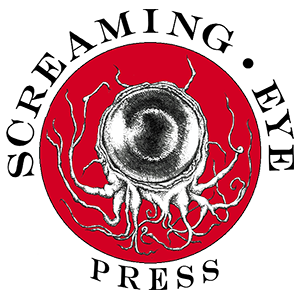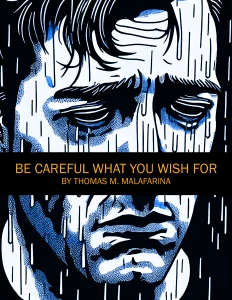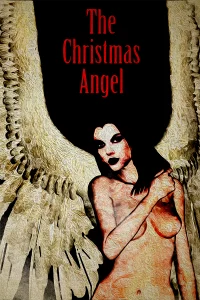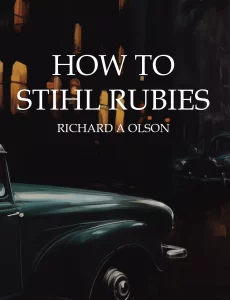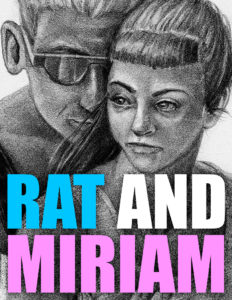Colin Upton on Art, Anarchy, and the State of Comics
A conversation with the underground artist on influence, obscurity, and what fuels his latest dark and daring work.
Written by Screaming Eye PressWhat was the first thing you remember reading?
I came relativily late to reading as I have multiple learning disabilities. Perhaps this is what attracted me to comics where words and pictures are mutually supportive. My father was an historian so we had many illustrated historical coffee table books in the home that I used to study, which began my affection for illustration. The first book I remember sitting down and reading on my own was a short children’s book on Western Front Campaigns of World War 2. I do remember quite well my parents arguing whether or not to buy a copy of “Asterix The Gaul” at the UBC bookstore when I was about 10 years old as they knew I and my siblings would fight over it. We did but I’m glad they did buy it.

What got you into cartooning and what was your first publication?
Initially it was Franco-Belgian comics, first Asterix, then Tintin, later Hugo Pratt and anything I could find that was available in English, which at the time was not a lot. I collected Classics Illustrated adaptations of great books and plays. My dad, who was a doddler, had the Penguin History of Comics which was the first book I saw about comics. As I got older I came across Underground Comics, Crumb, Spain, Holmes, etc which were unsettling in their depiction of drugs, sex and a counter-culture I was too young to be a part of, with complete artistic freedom. Then there was Heavy Metal magazine’s production values and high artistic standards that seemed so sophisticated. Of course the autobiographical comics of Harvey Pekar was a major influence. Lowbrow Art and the Punk Rock zine scene inspired Self-published Small Press Mini-comics that are so much of my artistic life. Later on I gobbled up whatever world comics I could find in English from Europe and elsewhere. Manga is a vast field that I am still exploring.
My first publications were a gang printing of two 12 page mini-comics printed on a friends Gestetnar. “The Collected Socialist Turtle” (a comic strip parody of the Marxist-Leninists of Canada’s dogmatic rhetoric) and “The Granville Street Gallery” which was a collection of portraits of people drawn surreptitiously from life on downtown Vancouver’s main entertainment/shopping district. When I started I really struggled to find something worth doing comics about.

Do you prefer to publish with bigger publisher’s as opposed to smaller or underground publishers?
I’ve only had one job with a major publisher, illustrating a page for The Big Book of Urban Legends for DC. No editorial hassles. The nice thing about it was it paid $200.00 just for the art, which is the best page rate I ever saw. I think that DC pays less now. I got $400.00 for an ENTIRE comic book, story and art, from Fantagraphics. Still, it was less about the money but at the time it was about the cause! Seriously, we had a sense of mission to get the culture to take comics seriously.
What artist/writer inspires you the most?
To begin with, Herge. Later Harvey Pekar. Recently H.P. Lovecraft.
What piece of art or story are you proudest of?
I suppose it would be “Kicking At The Darkness” which I wrote and drew for the Vancouver Holocaust Museum about the Canadian Army in World War Two fighting across Europe and discovering the Holocaust on the way. They made only one minor change to the script I gave them. I avoided making it a tedious rendition of facts by including dramatic vignettes based on the research and reading I had done… yes, I am now a dedicated bookworm.

Do you think your environment, where you live, has an effect on the type of art you create?
I think so. Vancouver has it’s rough spots, the Lower East Side is essentially an open air drug market not a mile from where I live and the housing market is insane but on the whole the city is beautiful, the people pleasant, temperatures mostly mild (for Canada), it’s multi-cultural, artistic, with infrastructure and public services that mostly work well. Vancouver features regularly on lists of the worlds most livable cities. The city itself is something of a character itself in my comics as many of them are autobiographical. I am unusual amongst local artists with my focus on city life as the spectacular natural scenery around the city is such an inspiration for many. I call it “The tyranny of the landscape”.
Is it easier for you to create if given an assignment or does it get in the way of your creativity?
When I’m asked to do a project not of my making I consider it an interesting challenge, a chance to expand my boundaries. If I’m asked to do a story suitable for children I have no problem adapting. It’s when the parameters of a project are vague, unspoken and the rules change that I resent editorial interference.

Where do you think the world of literature/popular culture will be like in ten years?
Ashes, mostly… with digital books it will be easier to censor or purge authors whose works don’t live up to the ever-changing “current year” standards of political correctness. That’s why I buy paper books and Blu-rays of intact films, while you still can. As far as comics go Manga has pretty much supplanted American comics as a popular medium and no one in the mainstream comics companies has so far successfully produced an American imitation of Manga. Although Raina Telgemeier gets it. I do have high hopes for the graphic novel (basically the coming together of the Underground, Groundlevel, Indie and World comics streams) but as niche publishing. The way things are going graphic novels may make up a large rather niche in a shrinking book publishing world. The amount of great work currently available in graphic novel format is astounding! I fear that popular culture will become as polarized as everything else with progressive trans-Hobbits for the left and Saurons not so bad as he’s for law & order, for the right. Culture wars make for bad, dogmatic and boring art lacking nuance and I hope it ends soon.
What was the oddest thing you’ve ever been asked to do in your writing career? A specific assignment/books for a publisher?
Well, doing porn comics (Incubus 1 & 2) was something I’d never thought I would do, but for a time you could make decent money that way. I also pencilled, on a ridiculously tight deadline, a bio comic about a Metis leader of the Iroquois, John Norton, during the War of 1812. I passed it on to an inker on another insane deadline. When the comic came out they’d replaced all the art we’d done with someone else’s artwork that I suppose was edgier and less cartoony. Still got paid.
What projects are you working on now?
I haven’t been doing much in the last couple of years. First I went through a long, stressful process of getting on disability and when I’d gotten on disability Covid happened. So lately I’ve been feeling uninspired, rejected and forgotten. My mini-comics, particularly the auto bio stuff, were feeling stale. Small press has become harder to do as the local print shops with their inexpensive self serve copiers are all closing down. I did flesh out and drew a 6 page story by autobiograpical comics writer Dennis Eichhorn from a synopsis he’d left for a posthumous collection that doesn’t seem to be going anywhere currently. What I have been doing is a long story in a series I’m calling “The Gwen Ghoul Variations” of which two digests are out about Ghoul’s named Gwen. The one I’m working on now “The Murder Artist”, is a near future mash up of Clockwork Orange, 1984 and HP Lovecraft’s Ghouls with perhaps a little Kafka in an all-female “utopia”. It’s about art, sex and death. It is totally unacceptable by todays standards which encourages me to push further. I’m in that “don’t give a fuck “stage of life. If nothing else, it’s a change from the autobiographical comics I’m known for.
